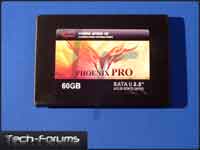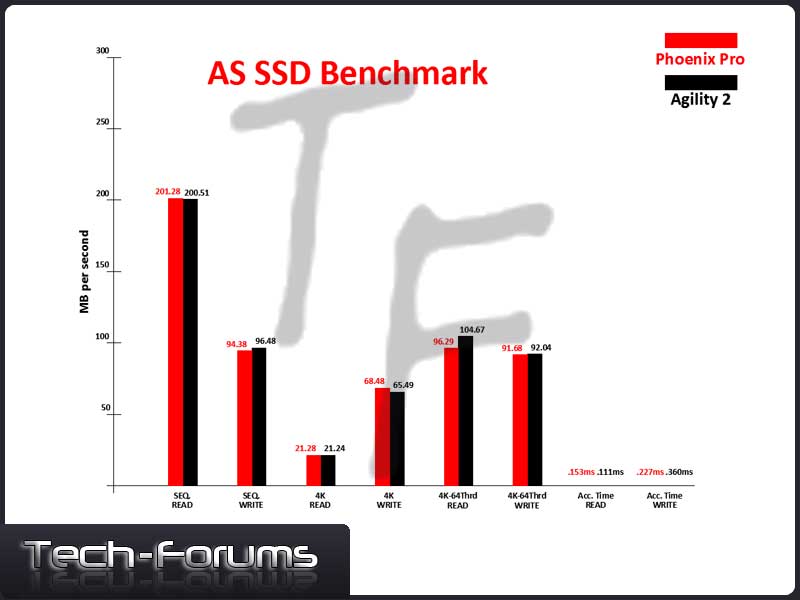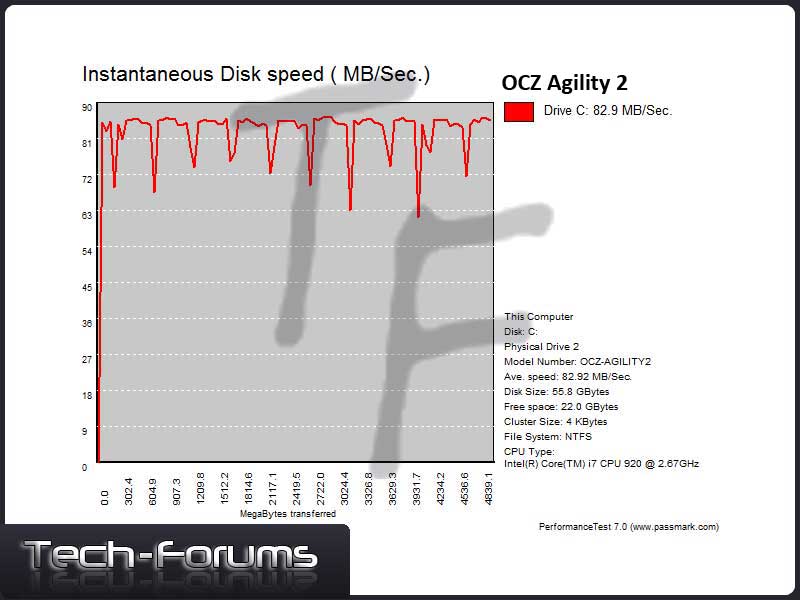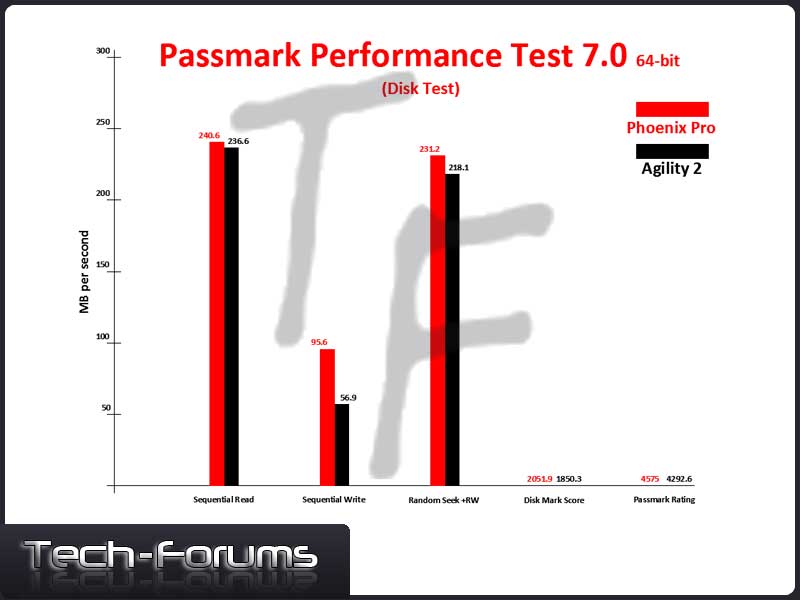
G.Skill Phoenix Pro 60GB SSD
FM-25S2S-60GBP2
By: Dan Durland
Introduction
G.Skill, established in 1989, is a well-known manufacturer of enthusiast memory modules. In 2008 G.Skill expanded their product line, venturing into the Solid State Drive (SSD) market. It's now 2010 and G.Skill has just recently released its newest SSD, the Phoenix Pro, based on the new SandForce SF-1200 controller.
Less than a month ago I tested another SSD based on the SandForce SF-1200 controller, the OCZ Agility 2. For that evaluation I used my Windows 7 Professional 64-bit (with TRIM support), i7-based gaming system. This evaluation will be a little different as I'll be using a Windows XP Professional x64 (with no TRIM support), i7-based workstation. Why, you ask, use a different system? Well the firmware for most SandForce based SSD's support drive initiated garbage collection. This garbage collection is a function meant to replace the TRIM command on operating systems other than Windows 7. So the data I am collecting today will also be used in a follow up article on TRIM and Garbage Collection Drive Performance.
Specifications
- Available in 40GB to 240GB capacities
- Native TRIM support
- SATA Interface: SATA II 3.0Gbps
- Power Supply: 5.0V +/- 5%
- Package: Complete Metal Housing
- Access Time: >0.1ms
- 2.5" Form Factor
- 69.63 x 99.88 x 9.30mm
- Operating Temp. Commercial: 0°C ~ 70°C
- Operating Temp. Industrial: -40°C ~ +85°C
- Shock (operating) 1500G
- Vibration (operating) 15G
- Altitude (operating) 60,000 ft.
- Included 2.5†to 3.5" adapter bracket
- MTBF: +2,000,000 hours
- Data Reliability: Built-in EDC/ECC function
- Data Integrity: 5 years
- Wear Leveling Algorithm: Patent Pending
- Warranty: 3 years
40GB Maximum Performance
- Max Read: up to 280 MB/sec
- Max Write: up to 270 MB/sec
- Random Write 4k (Aligned; QD=32): Up to 50000 IOPS
60–240GB Maximum Performance
- Max Read: up to 285MB/s
- Max Write: up to 275MB/s
- Random Write 4KB (Aligned; QD=32): Up to 50000 IOPS
Image Gallery
The Phoenix Pro is packaged in a small box, 153 x 126 x 31 mm, yet it is still larger than any other SSD packaging I've received.


Inside the box we find the Phoenix Pro SSD completely encased in a thick neoprene enclosure that also houses a 3.5†adapter bracket, the user guide and screws.



The user guide is rather brief, listing information about the specifications, installation and warranty.

And here are a few close-ups of the drive itself.


The Phoenix Pro is cased in a screw free metal housing and it was more than a little aggravating to take apart. Once I finished voiding the warranty I took a couple pictures of both sides of the circuit board and the connectors.



I re-assembled the drive, attached the 3.5†adapter and installed it in my case.

Test Systems & Software
Test System 1
- Intel i7 920
- EVGA E757 X58 LE
- OCZ Platinum 12GB(6x2GB) DDR3 1600
- EVGA GTX 280
- Corsair 750w PS
- G.Skill Phoenix Pro 60GB – Windows XP Pro x64
- Seagate Barracuda 250GB SATA II 7211.10 – Page File/Data
Test System 2
- Intel i7 920
- EVGA E760 X58 Classified
- Corsair Dominator GT 6GB(3x2GB) DDR3 2000
- EVGA GTX 480 SLI
- Cooler Master 1250w PS
- OCZ Agility 2 60GB – Windows 7 Pro 64-bit
- Seagate Barracuda 250GB SATA II 7211.10 – Page File/Data
Software
- AS SSD Benchmark
- ATTO Disk Benchmark
- CrystalDiscMark
- Everest Ultimate
- HD Tune Pro
- Passmark Performance Test
- PCMark04
Neither of these drives will be tested bare or with a minimal amount of software. Both drives have fully updated 64-bit Windows operating systems along with all of my usual applications installed. No one buys a drive just to leave it empty so why test it that way.
Test Results
- AS SSD Benchmark

The drives perform almost equally in the AS SSD Benchmark with the only noticeable difference being the 4K-64 Thrd Read times. This means the Phoenix Pro is slightly better at multiple simultaneous 4K Reads.
- ATTO Disk Benchmark

Once again both drives are performing pretty equally. We see the G.Skill winning at the 16K, 32K, 128K, 512K and 1024K while the OCZ drive wins the 4K, 8K, 64K and 256K.

In the ATTO write test we see the G.Skill Phoenix Pro sweep every category.
- CrystalDiskMark

This Benchmark is quite similar to the AS SSD Benchmark and the results seem to support that conclusion as well. The only real difference is the 4K-QD32 read and write results, with half of the 4K reads we see the drives are almost equal now and with half as many writes we see the G.Skill Phoenix Pro take a lead. I can only conclude that something in the coding of these two benchmarks is responsible for these variations.
- Everest Ultimate

Everest will only perform write tests on a bare drive, but it does test our read speeds. Here we see the Phoenix Pro outperform the Agility 2 across the board.
- HD Tune Pro

Once again we see these two drives running neck to neck with the Phoenix Pro showing a small performance lead in every test size except at 128K and 1024K.

At the 1024K and 2048K level of this test the Phoenix Pro is running about 17-18 MB/s slower than what I was expecting to see. I ran the benchmark again with similar, but slightly better results. I still got a dip of approximately 10 MB/s but this time it was at the 512K and 1024K level. Because I was able to replicate a similar dip in performance I decided to post the original numbers. Overall the Phoenix Pro dominated this test and the dip in performance could be related to a number of factors, Xp vs. Win7, Firmware, drivers or it could be the drive hitting a few “dirty†sectors that the garbage collection utility hasn't “cleaned†yet.
- Passmark Performance Test


Here we see Passmark testing the Instantaneous Disk speed and the Phoenix Pro takes this test by 4.1 MB/s. I also noted that the Phoenix Pro is showing a significant dip in performance at the 40.8 sec mark which is very similar to the dip I saw in the HDTune Pro write test.

Passmark also has a basic disk test and the Phoenix Pro is crushing the Agility 2 in the Sequential Write segment by almost 70%.
Conclusion
With the exception of a few dips here and there, the Phoenix Pro equaled or exceeded the Agility 2 in the majority of the tests I performed. It should be noted that the Phoenix Pro is G.Skill's Enthusiast or Enterprise line of SSD's whereas the Agility 2 is more of a Mainstream drive. So the performance of the Phoenix Pro should be expected to be slightly better overall than the Agility 2, which it was.
Pricewise, the Phoenix Pro is very competitive with the other manufacturers, ranging from $2/GB to $2.63/GB depending upon the size of the drive. The 60GB drive I tested today can be found for $139.99 or $2.33/GB and I have seen it as low as $114.99 or $1.92/GB on sale.
Pros
- High Performance
- Competitively Priced
- No Moving Parts
- Quiet
- Produces Little to No Heat
- TRIM Support
- Includes 3.5†Desktop Adapter Bracket
- 3-year Warranty
Cons
- Still Expensive
- Performance Fluctuations were noted
Final Thoughts
I have to say that I'm impressed with the performance of the Phoenix Pro. While a few performance fluctuations were noted, at this time I cannot pinpoint the drive as the actual cause. And while the price is still expensive compared to a regular mechanical hard drive, the level of performance is extreme if you are willing to pay for it.
Rating
The Phoenix Pro is an excellent product that I highly recommend with a 4.5 Star Rating.

I would like to Thank G.Skill for allowing Tech-Forums to review the Phoenix Pro and I look forward to evaluating more of their products in the future.

